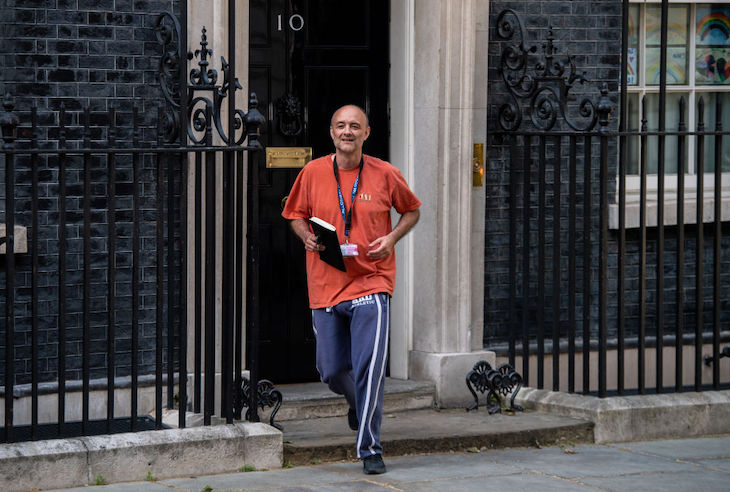Nothing in Caroline Flint’s résumé would have marked her out as someone who would end up marshaling 19 of her fellow Labour MPs through the ‘aye’ lobby to vote for Boris Johnson’s deal. One of the original ‘Blair babes’, she went on to become Gordon Brown’s minister for Europe. She campaigned for Remain in the referendum but this week she ended up telling MPs that ‘the EU is not God’ while fending off accusations that she is the devil. One commentator called her ‘a heroine for those seeking to turbo-charge Thatcherism’. He didn’t mean it kindly.
When we meet in her office, on another one of the supposed Brexit make-or-break days, she is preparing for further battle. ‘I just think: hang on a minute, I’m the moderate here,’ she says. ‘I’m trying to stop no-deal by getting a deal. Accepting that we’ve had a vote to leave the European Union.’ Labour, she says, owes Brussels nothing. ‘The EU didn’t protect us from Thatcher. It didn’t protect us from privatization. It didn’t protect us from the sale of council houses. And it didn’t protect us from our mining communities being devastated. Labour governments stopped Tory policies, not the EU.’ The surest means of getting another Labour government, she says, is for it to back Brexit now.
Her obstinacy can be traced to a fateful decision she made while campaigning for Remain in June 2016: that, if her side lost, she resolved she would respect the result. ‘I had conversations with MPs, with my family and others asking: if I campaign for Remain, what if it goes the other way?’ The ‘over-confident arrogance of the Remain campaign,’ she says, led it to make some terrible decisions. She describes sitting in Remain campaign meetings where every time she suggested that a certain tactic wouldn’t work in Doncaster, ‘it was like tumbleweed going around the room’.
In 1997 she became the first woman to represent the mining community of Don Valley: two-thirds of voters there supported Brexit. She felt that politics had been shifting for some time, and had long worried about why so many in her constituency had turned to Ukip. ‘It wasn’t the case that people were against all migration. What they were concerned with was the rapid changes in some of our communities. They had never experienced the sort of migration that London has over hundreds of years.’
Her constituents, she says, could also see how local employers reacted to the sudden supply of reliable, low-cost workers from the EU. ‘They saw employers basically taking on board a whole number of employees from eastern Europe wholesale — as opposed to recruiting locally.’ On the night of the referendum result, she had a fair idea of how the country was divided. The Remainers, she says, were betting ‘that the big cities would turn out enough to make sure the result went for Remain’ but the vote was swung by ‘regions outside of London’, such as the corner of South Yorkshire that she represents.
She is now working with Johnson’s advisers to try to (in the Prime Minister’s words) ‘get Brexit done’. And unlike her own party, the Tories have taken a genuine interest in Flint and her colleagues. ‘What they are interested in is, obviously, to know and understand what our views are. What we expect, in order to vote for a deal,’ she says. She finds No. 10 surprisingly attentive. ‘I would say they are listening. To be honest, I wish we’d been heard more about our concerns on the Labour side.’
She feels that her fellow Labour MPs helped the deal along. ‘Nineteen Labour MPs wrote to Tusk and Juncker saying: “There is a majority in parliament for a deal, there are Labour votes to support this, please work night and day to secure a deal.” Everyone went: “Oh, it won’t happen.” And then it did. Who’d have thought it? So that’s it. Move on. Deal with what we’ve got in front of us, rather than what’s in the past.’
As a Labour government minister, Flint became known for being pretty blunt. She accused Gordon Brown of using her as ‘window dressing’ and has adopted the same take-no-prisoners approach to colleagues who attack her now. Where some seem ground down by the abuse they are receiving, Flint is just annoyed. ‘I basically say what I think,’ she says, with a smile. ‘If people say something back to me which is a misrepresentation of what I’ve said, I will rebut that.’
She herself is a graduate of the school of hard knocks: the daughter of an alcoholic single mother, she spent her early years in a pub run by her grandparents and aged 17 went back there to work as a barmaid. After university, she became an official for the GMB trade union and her political career thrived. She admits some friendships in her own party have been strained by her pro-Brexit stance, but says she’s gained new pals (including on the Tory side). Which nowadays arouses suspicion.
During one debate, a fellow Labourite was overheard saying to her: ‘Oh cross the floor, why don’t you cross the floor.’ Flint has grown used to ‘murmuring and heckling’ as well as ‘eye-rolling’ but she does not feel that she’s being in the least bit disloyal to Jeremy Corbyn. ‘He has a history of voting against pretty much every EU treaty there has ever been. Everybody knows that.’ Which is why she’s backing a deal now. ‘Is it a perfect deal? Who knows what a perfect deal looks like! I always thought the argument was no deal is the worst option.’
Labour MPs who oppose Brexit now, she says, do their party no favors. ‘If we go into a general election before we’ve left the European Union, then it will all be about Brexit,’ she says. ‘We’re not going to get a hearing for any of the policies we’ve got around the NHS, around tackling homelessness, or our industrial strategy.’ So when she’s attacked for betraying her party, she responds that she’s one of the few fighting to save it. ‘I think we’re in a much better position to win — and win with Jeremy — if we’ve left the European Union.’
She turned up to the emergency sitting of the Commons last Saturday in a razor-sharp teal trouser suit which stood out among the navy and black jackets of the mainly male MPs around her. I ask if she was power-dressing because she knew it was going to be a fiery debate. She roars with laughter. ‘Maybe it’s about my background as well: working-class culture. On big occasions — weddings, parties, work — you turn up appropriately attired. That’s what you do.’
But in these hyper-partisan times, even wardrobes can be scanned for hidden messages. ‘I’ve had that before — this is the most stupid, crappy thing — people saying: “She’s wearing a blue blouse, she’s a Tory, you know.”’ Well, I actually have got this lovely red coat up there,’ she says, pointing to the wall. She still sees herself as red through-and-through and thinks getting Brexit done is the surest route to a Labour government. ‘What I hear most is that the public want us to agree a deal. They want some calm and certainty. And that means allowing what-ever deal is agreed.’
This article was originally published in The Spectator’s UK magazine. Subscribe to the US edition here.


























